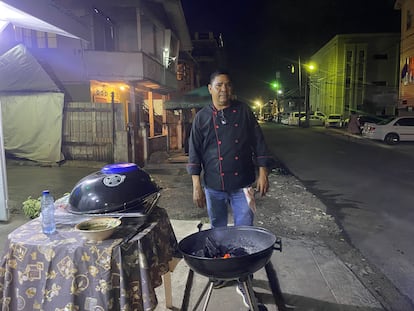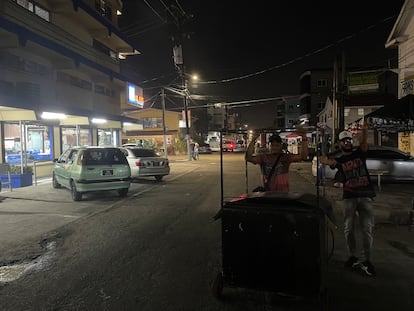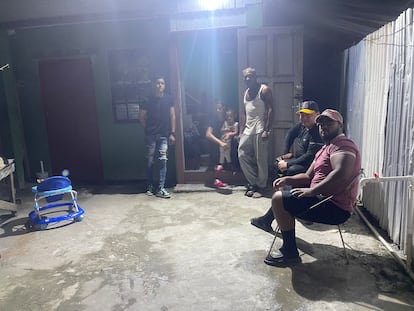Venezuelans in Guyana: ‘There’s racism, but there’s also a lot of money’
Some 35,000 Venezuelans are trying to make their way in this small neighboring country, which is experiencing an oil boom. Guyana maintains a dispute with the Maduro administration over the Essequibo region


While walking along Robb Street, located in the heart of Georgetown, the largest city and the capital of Guyana, you’re immediately transported to the center of Caracas. On the rough sidewalk, under weak light, there are stalls selling arepas, cachapas and tequeños, typical Venezuelan food. On the residents’ patios, illuminated by light bulbs that flicker in the darkness, accents from Apure, Miranda, and Sucre can be heard. A good number of the estimated 35,000 Venezuelans who live in the country have made this place their home.
“In Guyana, there’s racism, but there’s also a lot of money,” says Kenny Rodriguez, a 30-year-old Venezuelan who wears a pair of Oakleys. The father of three children, he came to Guyana by canoe from San Martín de Turumbán, on the border, to work in the gold and diamond mines. “But dammit, there were a lot of diseases there, a lot of malaria,” he recalls. These difficult conditions encouraged him to come to Georgetown and set up a food cart on Robb Street. He goes up and down the pavement, waving and calling out to passerby: “Hello my friend! Papi, what’s happening?” He makes it clear that this is a place where you can earn people’s respect, so long as you don’t go around committing crimes.

This semi-unknown country — a former British colony where the custom of speaking English and driving on the right have remained — only has 800,000 inhabitants. It’s experiencing an oil boom, due to deposits discovered by ExxonMobil off its coasts in 2015. Over the last two years, the money pouring in has finally been noticed: in 2022, Guyana’s GDP grew by 62%, while it’s expected that 2023 will close with an increase of 37%. In the entire world — according to the IMF — no country records similar figures.
Right now, Guyana produces 400,000 barrels of oil a day. Experts estimate that, in four years, daily production will reach 1.2 million. The government hopes to triple the per capita income of its citizens, which is currently around $10,000 annually, in a short time. Economists don’t remember an equal impact on an economy in such a compressed period of time. Guyana, overnight, could become the South American UAE.
In this land of opportunity, Venezuelans have found the future that was denied to them in their own country. According to the UNHCR, at least 7.7 million have emigrated to destinations around the world, due to the serious political and economic crisis that the country continues to experience. The majority of Venezuelan refugees have settled in Peru, Colombia, Chile, and Brazil. However, a few decided to come to Guyana, a nation with two ethnic majorities: the Afro-Guyanese, who are descendants of slaves, and the Indo-Guyanese, who arrived during the British colonial era.
Joana Flores, 45, arrived from Venezuela six years ago, because she didn’t require a visa to enter. She hasn’t left Guyana since. “I have my entire life here: I brought my two daughters and I adopted a little Black baby, in a hospital here,” she tells EL PAÍS, in the bar that she’s set up on a corner in Georgetown.
She began her time in Guyana by selling cakes on the street. After saving enough money, she opened her establishment, which offers breakfast and lunch to groups of workers, many of them Venezuelans. At night, it becomes a pub with Latin music. She hasn’t suffered from any acts of racism. Not even now has she been bothered, with President Nicolás Maduro reviving an old dispute over ownership of Essequibo, a region rich in minerals and oil that Venezuela claims as its own.

Lashawn, a 23-year-old Guyanese citizen, comes into the pub to buy a couple of beers. He wears jeans and has dreadlocks: he works washing cars nearby. “Venezuelans are really cool, they’ve come to brighten up the neighborhood,” he says with a smile.
Joana defends Guyana vehemently. “Thanks to this country, my daughters speak English and will be able to work as professionals… something they would not be able to do in Venezuela. This is my home.” She has three employees: two Cubans and one Venezuelan, a cook named Daniel Contreras. She doesn’t even want to hear about the dispute between her country of origin and her host country over Essequibo, which can only bring problems and resentment, distancing her from the locals. The two countries have experienced weeks of tension, to the point that many feared that the matter could lead to a war before a non-aggression pact was sealed.
Three months ago, 45 Venezuelans were detained by Guyana’s security forces when they tried to enter the country illegally in a dilapidated fishing boat, on the east coast of the Essequibo region. They carried their belongings, as well as some roosters. A day earlier, another 80 were intercepted at the border. Local authorities believe they set sail from the island of Grenada. After being processed by immigration authorities, they were released.
“What does Maduro want Essequibo for? To turn it into shit?” This is a saying that’s frequently tossed around at the entrance of a two-story house on Robb Street. Here, Cubans and Venezuelans rent rooms from a Guyanese man, at a rate of $300 a month. The night is warm: it’s the ideal temperature to wear an undershirt. Life seems peaceful while drinking brandy on the stairs of the building. David Chacón, a 19-year-old Venezuelan, works in construction. His English is broken. The other day, he was walking down the street, minding his own business, when a group of Guyanese pushed him for no reason. He restrained himself and continued on his way: he didn’t want problems. “I don’t mess with anyone,” he says.
48-year-old Salvador González, who hails from Cuba, says that he’s suffered a couple of episodes of racism, especially when he worked behind the counter of a store and had trouble understanding certain customers (he was still learning English). Nowadays, he works as a bricklayer, a plumber and a carpenter. He does anything to send money to his three children back in Venezuela.

Juan Daniel Mendoza sweats because of the humidity. He arrived in Guyana with a wife and two children. “They brought me in as a joke,” he says, making the rest of the group laugh. “I imagined this would be like Las Vegas, but Georgetown is ugly. Of course, there’s work, you can see the money. Sometimes, I feel strange. If five Black Guyanese guys are working on a construction site and I approach, I’m the white sheep. They pretend I don’t exist.”
At that moment, a woman with a child in her arms looks out the window and shouts: “Maduro is no good, he ruined a beautiful country.”
The clock strikes midnight. Robb Street empties out. Tomorrow, it will dawn again in this little Caracas.
Sign up for our weekly newsletter to get more English-language news coverage from EL PAÍS USA Edition
Tu suscripción se está usando en otro dispositivo
¿Quieres añadir otro usuario a tu suscripción?
Si continúas leyendo en este dispositivo, no se podrá leer en el otro.
FlechaTu suscripción se está usando en otro dispositivo y solo puedes acceder a EL PAÍS desde un dispositivo a la vez.
Si quieres compartir tu cuenta, cambia tu suscripción a la modalidad Premium, así podrás añadir otro usuario. Cada uno accederá con su propia cuenta de email, lo que os permitirá personalizar vuestra experiencia en EL PAÍS.
¿Tienes una suscripción de empresa? Accede aquí para contratar más cuentas.
En el caso de no saber quién está usando tu cuenta, te recomendamos cambiar tu contraseña aquí.
Si decides continuar compartiendo tu cuenta, este mensaje se mostrará en tu dispositivo y en el de la otra persona que está usando tu cuenta de forma indefinida, afectando a tu experiencia de lectura. Puedes consultar aquí los términos y condiciones de la suscripción digital.








































